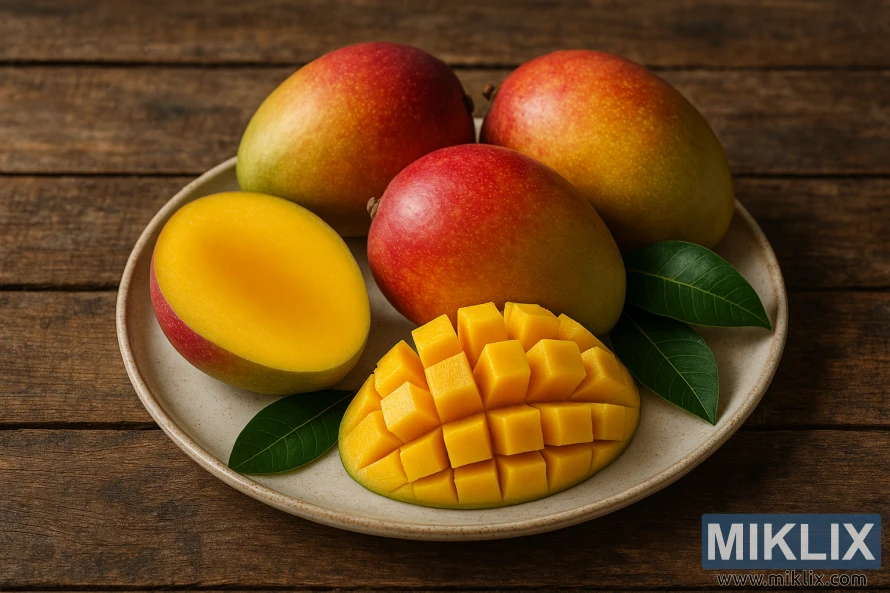The Mighty Mango: Nature’s Tropical Superfruit
Published: May 21, 2025 at 10:04:47 AM UTC
Last updated: December 24, 2025 at 11:16:45 AM UTC
Mangoes are loved for their tasty flavor and health benefits. They are called a tropical superfruit. Eating mangoes can do more than just satisfy your sweet tooth. They are full of vitamins and minerals, making them great for your diet. Adding mangoes to your meals can help your heart, boost your immune system, and aid digestion. Let's dive into the nutritional value of mangoes and how they can improve your health.

Key Takeaways
- Mango is a tropical superfruit rich in essential nutrients.
- It provides numerous health benefits, including heart health support.
- Mango may enhance immune function and digestive health.
- The nutritional value of mango makes it an excellent choice for balanced diets.
- Incorporating mango into your diet can help with overall well-being.
Introduction to Mango
Mango, known as the "king of fruits," is loved in India and Southeast Asia. It has a history of over 4,000 years. This tropical fruit has been grown for thousands of years, leading to many types.
Each type of mango has its own taste, shape, and color. This makes mangoes a favorite fruit globally. They are not just tasty but also packed with nutrients.
Packed with Nutrients
Mangoes are a powerhouse of nutrients, making them a great addition to your diet. A single cup, about 165 grams, offers impressive benefits. It has a lot of vitamins in mango.
This serving size gives you about 67% of the daily vitamin C you need. Vitamin C is key for a strong immune system and helps repair tissues.
Mangoes also have a lot of other important nutrients:
- Copper
- Folate
- Vitamin A
- Vitamin B6
- Vitamin K
- Vitamin E
These vitamins and minerals are essential for staying healthy. Eating mangoes can boost your nutrition and help you live a balanced life.
Low in Calories
Mango is a great choice for those watching their calories. It has about 99 calories per cup. This makes it perfect for a weight management plan without sacrificing taste.
The fiber in mango helps you feel full. This can stop you from eating too much. It's a tasty way to manage your weight.
Despite being low in calories, mango is full of flavor. Its sweet and juicy taste makes it a great snack. You can eat more of it without worrying about your diet.
Supports Digestive Health
Mangoes are great for your digestive system, thanks to their high fiber content. They have both soluble and insoluble fiber. This helps keep your bowel movements regular and prevents constipation.
Mangoes also have digestive enzymes like amylases. These enzymes help break down carbs, making digestion easier. Studies show eating mangoes can improve digestion better than fiber supplements.

Boosts Immune System
Mangoes are great for boosting your immune system. They are full of vitamin C, giving you almost 75% of what you need in one cup. Vitamin C helps make white blood cells, which fight off diseases.
Mangoes also have other nutrients that help your immune system. These include:
- Vitamin A
- Copper
- Folate
- Various B vitamins
These nutrients are key to a strong immune system. Mangoes also have antioxidants that fight off stress and inflammation. Eating mangoes often can help keep you healthy and fight off sickness.
Contributes to Heart Health
Mangoes are more than just a tasty tropical fruit. They are key to keeping your heart healthy. They are full of nutrients, including magnesium and potassium. These help your heart by controlling blood pressure.
Potassium in mangoes is also very important. It helps keep fluid balance right and lowers blood pressure risk. Eating mangoes can help keep your blood pressure in check, which is good for your heart.
Mangoes also have mangiferin, an antioxidant that protects heart cells. It fights off oxidative stress and inflammation. This can help prevent heart disease. So, eating mangoes regularly is great for your heart health.
May Aid in Diabetes Prevention
Fresh mango can help manage diabetes, even though it's sweet. It has over 22 grams of sugar per cup. Yet, studies show that eating mango in small amounts doesn't raise blood sugar levels. It might even help control blood sugar.
Mango contains compounds that could improve blood sugar and lower diabetes risk. This makes mango a good choice for those who want to eat fruits and stay healthy. Adding mango to a balanced diet could help manage diabetes well.
High in Antioxidants
Mangoes are not just tasty; they're also packed with health benefits. Their high antioxidant content helps protect the body from damage. Free radicals, harmful molecules, can harm cells and cause chronic diseases.
The antioxidants in mango, like mangiferin and catechins, are key. They help fight diseases and support overall health. Eating mangoes can help prevent some cancers and heart problems.

Supports Eye Health
Mangoes are great for your eyes because they're full of important nutrients. They have lots of vitamin A, which is key for good vision. Vitamin A helps keep the retina healthy and prevents night blindness.
Mangoes also have antioxidants like lutein and zeaxanthin. These help protect your eyes from blue light and damage. They might even lower the chance of macular degeneration.
Eating mangoes is a tasty way to boost your eye health. With vitamins and antioxidants, mangoes are a great choice for anyone wanting better vision.
May Lower Cancer Risk
Mangoes are packed with compounds that might help prevent cancer. They contain polyphenols, like mangiferin, which show promise in fighting cancer. These substances can help reduce oxidative stress and slow down cancer cell growth.
Studies suggest that mango's polyphenols could be very effective against breast, colon, and prostate cancers. While more research is needed, adding mango to your diet could help in cancer prevention.
Aids in Weight Management
Mango is not just a tasty treat; it also helps with weight management. It's packed with nutrients and low in calories, making it great for weight loss.
Mango is rich in fiber, which helps you feel full. This can stop you from eating too much during the day. Adding mango to your meals or snacks can make you feel satisfied without adding too many calories.
Choosing mango as a snack is a smart move for those who want to eat healthy. It's a delicious way to support a balanced diet and help manage your weight. This makes mango a top pick for a healthy lifestyle.
Improves Skin and Hair Health
Mangoes are great for your skin because they're full of vitamins and antioxidants. They have vitamin A, which helps keep your skin looking good. Eating mangoes often makes your skin glow.
Vitamin E in mangoes protects your skin from harm. It makes your skin soft and beautiful. It also helps fix damaged skin.
Mangoes are also good for your hair. They give your hair follicles the nutrients they need. This makes your hair stronger and shinier. Adding mango to your diet or using mango skincare is a smart beauty move.

Versatile and Delicious
Mangoes are a delightful fruit with many uses. Their sweet, juicy flesh is perfect for various dishes. Enjoy them fresh, in smoothies, or in vibrant salads for a burst of flavor.
This fruit is incredibly versatile. Grill mango slices for a unique twist in savory dishes. Or, use them in fresh salsas that go great with fish and poultry. Mango chutney is a tasty addition to meals. You can also puree mangoes into sauces or desserts.
Learning how to prepare and serve mangoes can make your meals more flavorful. Try fresh mango salads or creamy mango desserts. Explore the world of mangoes and let your creativity shine in the kitchen.
Considerations for Consumption
Mangoes are a tasty and healthy choice for many. But, some people might have mango allergies because of urushiol sensitivity. This oil is in the fruit's skin and pits. It can cause skin problems, like those from poison ivy.
Here are some precautions with mango to keep in mind:
- Peel mangoes thoroughly to minimize exposure to urushiol.
- Opt for mango products prepared by those who do not have urushiol sensitivity.
- Consume mangoes in moderation due to their natural sugar content.
By taking these precautions with mango, consumers can enjoy the fruit’s many health benefits while minimizing any possible allergic reactions.
Mango: A Tropical Treasure
Mangoes are known as a tropical treasure. They are loved for their tasty flavors and health benefits. Originating from South Asia, mangoes have been grown for thousands of years.
Now, mangoes are enjoyed worldwide, with many varieties to choose from. Each variety has its own taste and texture, making meals more exciting.
This fruit is more than just a snack. It's packed with nutrients. Mangoes are colorful and juicy, making them a great addition to any diet.
Enjoy them fresh, in smoothies, or salads. Mangoes add flavor and health to every dish.
Conclusion
Mangoes are not just tasty; they're also packed with nutrients. They boost your immunity, help your heart, and aid digestion. Adding mango to your meals is a sweet way to improve your health.
Mangoes are versatile and can be used in many ways. You can blend them into smoothies, add them to salads, or eat them fresh. They're a great addition to a healthy diet, giving you important vitamins and minerals.
By making mango a part of your meals, you're choosing a healthier lifestyle. Mangoes offer more than just flavor; they're a nutritional powerhouse. So, enjoy mangoes more often and watch your body benefit!

Further Reading
If you enjoyed this post, you may also like these suggestions:
- Eating Green: How Asparagus Fuels a Healthier Life
- The Mighty Lentil: Small Legume, Big Health Benefits
- Unlocking Vitality: The Surprising Benefits of Co-Enzyme Q10 Supplements
